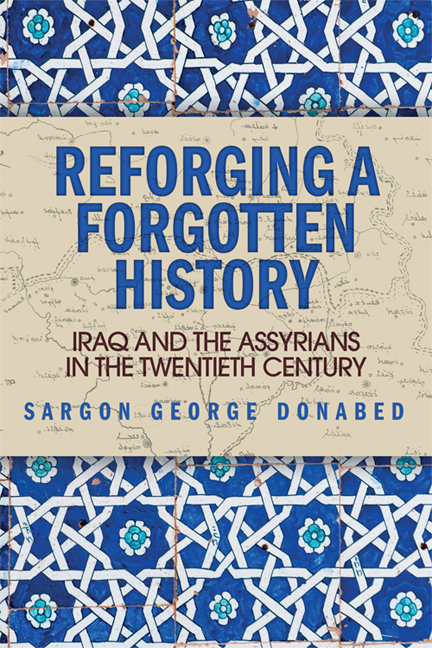Book contents
- Frontmatter
- Contents
- List of Figures
- List of Tables
- Abbreviations
- Acknowledgements
- Dedication
- Map
- Introduction
- 1 Integrating the Assyrian Question
- 2 Framing the Assyrian Narrative: Late Nineteenth and Early Twentieth Century
- 3 Iraq: Building a ‘Nation’-State
- 4 The Birth of the Republic and an Autonomist Struggle
- 5 Enduring Discord: Political Machinations and Border Clearings
- 6 New Movements and War on the Horizon
- 7 State Formation, State-building and Contentious Pluralism
- 8 Conclusion
- Glossary
- Appendix A Village Data
- Appendix B Documents Concerning Cultural and Political Organisations
- Bibliography
- Index
4 - The Birth of the Republic and an Autonomist Struggle
Published online by Cambridge University Press: 05 September 2016
- Frontmatter
- Contents
- List of Figures
- List of Tables
- Abbreviations
- Acknowledgements
- Dedication
- Map
- Introduction
- 1 Integrating the Assyrian Question
- 2 Framing the Assyrian Narrative: Late Nineteenth and Early Twentieth Century
- 3 Iraq: Building a ‘Nation’-State
- 4 The Birth of the Republic and an Autonomist Struggle
- 5 Enduring Discord: Political Machinations and Border Clearings
- 6 New Movements and War on the Horizon
- 7 State Formation, State-building and Contentious Pluralism
- 8 Conclusion
- Glossary
- Appendix A Village Data
- Appendix B Documents Concerning Cultural and Political Organisations
- Bibliography
- Index
Summary
The roots of violence: wealth without work, pleasure without conscience, knowledge without character, commerce without morality, science without humanity, worship without sacrifice, politics without principles.
Mahatma GandhiIn 1955, with the years following the end of the Second World War providing a cushion, the Western powers signed the Baghdad Pact, bringing about the Central Treaty Organisation, in an attempt to keep Soviet influence in the Middle East at bay. Despite the fear of rising communism, the British began a slow withdrawal of troops and military institutions from Iraq. Prior to the dissolution of the levies in May 1955 (though the RAF remained until 1959), its soldiers worked predominately as guards, with an overall composition of approximately 1,200 Assyrians, 400 Kurds and 400 Arabs. This external force was a constant threat to the ruling Iraqi elite, which perceived the highly trained and well-armed levies a threat to its sovereignty – a sovereignty dependent on the national unity of an otherwise pluralist society. Though their service in the levies was concluding, the troops were militarily recognised with medals of gallantry and valour for almost forty years of service. On 2 May 1955, the British finally transferred the last two airbases, Habbaniya and Shuaiba (Shaiba), to the Iraqi government.
City life had also begun to shift. Refugees who had settled in Baghdad formed Nādi al-Riyadhi al-Āthūrī (Assyrian Sports Club) as well as Nādi al-Thaqāfi al-Āthūrī (Assyrian Cultural Club) in March 1955. The sports club became the focus of athletics not only for Assyrians but also for the entire country. It was here that the national footballers Emmanuel ‘Ammo’ Baba Dawud (who played from 1957 until 1967 and later coached the Iraqi national team off and on from the late 1970s to the 1990s), Edison David (1955–65) and Douglas Aziz (1967–79) found their beginnings. The same is true for basketball, volleyball, tennis and other sports (see figures 12 and 13).
The 1958 Coup and Renewed Internal Strife
By February 1957 in the realm of politics, an opposition front had been established consisting of the National Democratic Party, Hizb al-Istiqlal al- Iraqi (the Iraqi Independence Party), the Iraqi Communist Party (ICP) and the Ba‘th Party, which had approximately 300 members in Iraq in 1955.
- Type
- Chapter
- Information
- Reforging a Forgotten HistoryIraq and the Assyrians in the Twentieth Century, pp. 138 - 168Publisher: Edinburgh University PressPrint publication year: 2015



